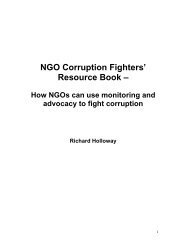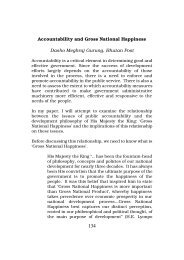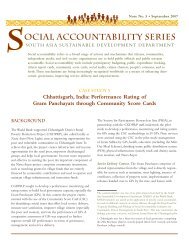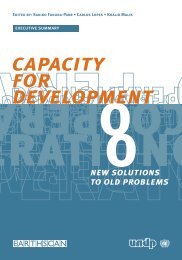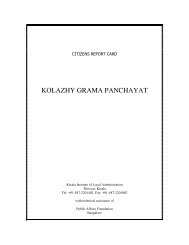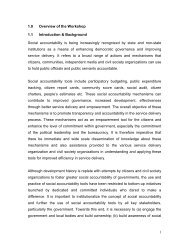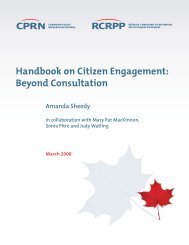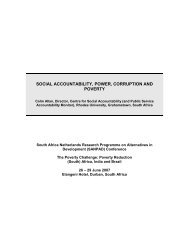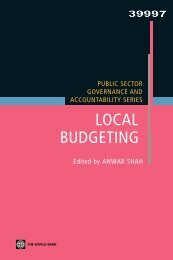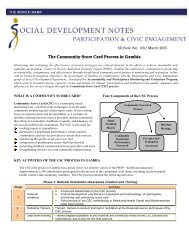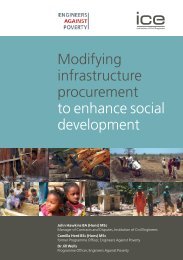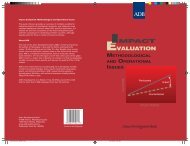Enabling Environment for Social Accountability in ... - SASANet
Enabling Environment for Social Accountability in ... - SASANet
Enabling Environment for Social Accountability in ... - SASANet
Create successful ePaper yourself
Turn your PDF publications into a flip-book with our unique Google optimized e-Paper software.
Recommendation: Public officials should amend secrecy laws to br<strong>in</strong>g them <strong>in</strong> l<strong>in</strong>e with <strong>in</strong>ternational<br />
standards. To ensure implementation, senior officials should send clear signals aga<strong>in</strong>st undue secrecy,<br />
such as discipl<strong>in</strong><strong>in</strong>g officials and civil servants who withhold <strong>in</strong><strong>for</strong>mation unlawfully. The GoM, with<br />
<strong>in</strong>itial donor fund<strong>in</strong>g, should also provide ongo<strong>in</strong>g tra<strong>in</strong><strong>in</strong>g <strong>for</strong> both civil servants and politicians on the<br />
negative effects of secrecy and the benefits of open government to socioeconomic development.<br />
F<strong>in</strong>d<strong>in</strong>g MEDIA 6. Defamation laws unduly restrict freedom of expression and exert a chill<strong>in</strong>g effect on<br />
media report<strong>in</strong>g.<br />
Recommendations:<br />
1) In collaboration with other stakeholders, public officials should comprehensively review and<br />
re<strong>for</strong>m the crim<strong>in</strong>al and civil defamation regimes to br<strong>in</strong>g them <strong>in</strong> l<strong>in</strong>e with <strong>in</strong>ternational<br />
standards. At a m<strong>in</strong>imum, the provision of imprisonment <strong>for</strong> defamation should be removed.<br />
International donor agencies, INGOs, and <strong>in</strong>terested CSOs with an expertise on defamation laws<br />
should actively advocate <strong>for</strong> these changes by, <strong>for</strong> example, provid<strong>in</strong>g comparative materials on<br />
defamation laws <strong>in</strong> other countries.<br />
2) Given the norms that have developed under the current defamation regime, stakeholders need to<br />
undertake explicit actions to ensure the implementation of re<strong>for</strong>ms to the legal code. With<br />
technical and f<strong>in</strong>ancial support from media-related CSOs and the donor community, they must<br />
revise the legal text and provide tra<strong>in</strong><strong>in</strong>g on its implications <strong>for</strong> both journalists and the judiciary.<br />
F<strong>in</strong>d<strong>in</strong>g MEDIA 7. The poor quality of media output <strong>in</strong> Mongolia is a product of <strong>in</strong>adequate fund<strong>in</strong>g and<br />
the related phenomenon of self-censorship, which threaten both freedom of expression and the public’s<br />
right to diverse and reliable <strong>in</strong><strong>for</strong>mation.<br />
Recommendations:<br />
1) Media-related CSOs, public officials, and media representatives should have a broad social<br />
consultation to analyze the factors that <strong>in</strong>fluence the quality of media report<strong>in</strong>g, such as the<br />
politicization of the media, fund<strong>in</strong>g constra<strong>in</strong>ts, weak ethical or professional norms, and the<br />
concentration of media ownership. They may also consider possible actions to enhance <strong>in</strong>centives<br />
to improve quality and reliability. Special consideration should be given to the establishment of a<br />
media council that offers country-specific recommendations to address the problem of poor media<br />
report<strong>in</strong>g.<br />
2) There should be additional tra<strong>in</strong><strong>in</strong>g <strong>for</strong> media workers, <strong>in</strong>clud<strong>in</strong>g editors and owners, that focuses<br />
not only on promot<strong>in</strong>g professional report<strong>in</strong>g, but also on enhanc<strong>in</strong>g the f<strong>in</strong>ancial viability of<br />
media outlets by promot<strong>in</strong>g efficiency and fundrais<strong>in</strong>g.<br />
3) Senior officials should take the follow<strong>in</strong>g measures to address the widespread phenomenon of<br />
self-censorship: Prosecute threats and acts of violence aga<strong>in</strong>st journalists to the fullest extent of<br />
the law and publicly expose the perpetrators; stop pressure to subscribe to particular media<br />
outlets; and <strong>in</strong>struct <strong>in</strong>telligence services workers to restrict monitor<strong>in</strong>g of media output to a<br />
limited set of legally def<strong>in</strong>ed issues related to state security.<br />
F<strong>in</strong>d<strong>in</strong>g MEDIA 8. Inadequate resources contribute to the poor quality, politicization, self-censorship,<br />
and ownership concentration of media <strong>in</strong> Mongolia.<br />
Recommendation: As the primary underly<strong>in</strong>g problem is that the number of outlets exceeds the market,<br />
broadcast licens<strong>in</strong>g and pr<strong>in</strong>t registration should reflect this concern, while the concentration of media<br />
ownership should be regulated.



